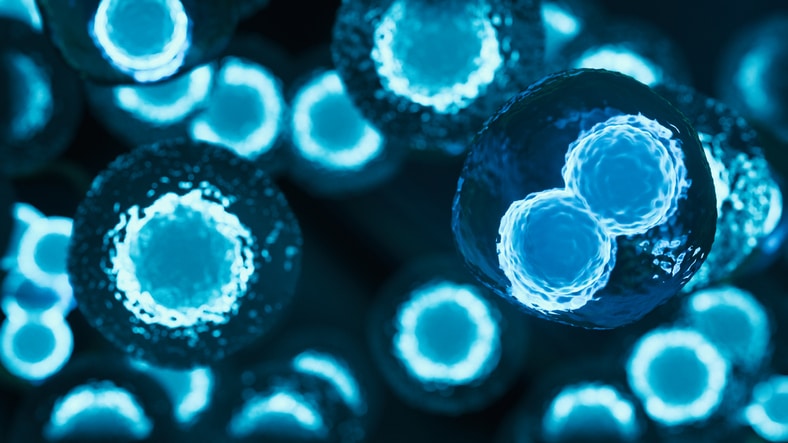Mesenchymal stem cells (MSCs) are the building blocks from which the practice of stem cell therapy, and the benefits it can deliver, are constructed.
They are an extraordinary and endlessly fascinating type of human tissue. They have remarkable properties, which we at the Stemwell Clinic harness to support healing and to improve the quality of life of those who come to us with a wide variety of physical conditions.
So let’s look in more detail at mesenchymal stem cells and shed light on the contribution they make to our work at Stemwell.

Where do Mesenchymal Stem Cells Come From?
MSCs are cells that occur naturally in the body. The term “mesenchymal” relates to their origin as mesenchyme. This is the description used for cells that come from the mesoderm germ layer, one of three that is formed during the early stages of development in a human embryo.
This is a layer that is the source of many cell types, including those that make up connective tissue, cartilage, and fat – as well as blood cells and the vessels that transport them.
These mesodermal cells are, crucially, undifferentiated. That means they have not at this stage been allocated to a specific purpose within the human body. This is one of the defining characteristics of MSCs, and it is the property that makes them most compelling for specialists who work in the regenerative medicine field.
It is possible to collect MSCs from a variety of sources. They can be found in bone marrow, in amniotic fluid, and in fat tissue. However, at Stemwell we believe the MSCs with the most powerful regenerative potential originate in the umbilical cord, NOT the embryo. As a result, the MSCs we use are harvested from the umbilical cords of healthy volunteer donors.
How do Mesenchymal Stem Cells Work?
The most important characteristic of MSCs is that they are undifferentiated signalling molecules. Their cell biology enables them to signal the body to develop various cell types, depending on what that body needs.
The range of tissue types that MSCs can support is extensive and includes bone, cartilage, muscle, and nerves. Stem cells support the body’s ability to regenerate tissues in vital organs such as the heart and liver, and in blood vessels.
Crucially, these cells have the ability to “work out” what the body needs so that they can support healthy tissue generation in areas where damage has been caused by illness or injury.
MSCs can signal your body to decrease inflammation and promote healing. They can help to regulate and modulate immune responses. They also release growth factors and cytokines, which effectively recruit other cells to the site of damaged cells that need repair.
Advantages of Mesenchymal Stem Cells
One of the principal advantages of mesenchymal stem cells is that they are undifferentiated. That means they can support the regeneration of a variety of tissue types. It is also relatively easy to harvest MSCs from umbilical cord tissue, compared to those that are sourced from bone marrow and amniotic fluid.
The fact that they are undifferentiated also lowers the risk of rejection by the body into which they are introduced. There should be no adverse reaction from the patient’s immune system.
Mesenchymal Stem Cell Protocol
Our highly trained team have considerable expertise in the mesenchymal stem cell protocol that ensures we collect, process, and apply the cells to support healing and improve a patient’s quality of life.
The first stage in the protocol is the harvesting of stem cells from the umbilical cord tissue donated by healthy, full-term volunteers. The cords go through a complex process that requires them to be washed, placed in a centrifuge, then thoroughly tested for viability.
Once the stem cells have been successfully collected, we administer more than 300 million cells in the treatment of patients undergoing stem cell therapy at the Stemwell Clinic.
Are Mesenchymal Stem Cells Pluripotent?
One of the properties of mesenchymal stem cells that make them such a compelling option for people seeking treatment is that they are pluripotent rather than multipotent.
Multipotent cells can differentiate into more than one cell type, but they are more limited than pluripotent ones. Pluripotent MSCs can develop into more than 200 cell types, which means they can be applied – and make a positive difference – to patients with a broad range of physical conditions.
What are Mesenchymal Stem Cells? Talk to Stemwell to Find Out More

MSCs are at the heart of the care we deliver and the expert assistance we provide in the form of regenerative therapy. Our trained team is dedicated to delivering the best possible outcome for every patient.
You can contact us to discuss your situation, and to tell you more about MSCs, their properties, and the benefits they can bring to our visitors, or apply today to check your eligibility.



